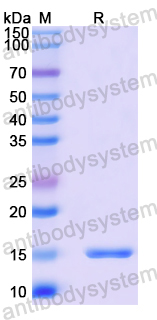Catalog No.
YHK89501
Expression system
E. coli
Species
Homo sapiens (Human)
Protein length
Asp481-Ser601
Predicted molecular weight
15.48 kDa
Nature
Recombinant
Endotoxin level
Please contact with the lab for this information.
Purity
>90% as determined by SDS-PAGE.
Accession
Q6UY14
Applications
ELISA, Immunogen, SDS-PAGE, WB, Bioactivity testing in progress
Form
Lyophilized
Storage buffer
Lyophilized from a solution in PBS pH 7.4, 0.02% NLS, 1mM EDTA, 4% Trehalose, 1% Mannitol.
Reconstitution
Reconstitute in sterile water for a stock solution. A copy of datasheet will be provided with the products, please refer to it for details.
Shipping
In general, proteins are provided as lyophilized powder/frozen liquid. They are shipped out with dry ice/blue ice unless customers require otherwise.
Stability and Storage
Use a manual defrost freezer and avoid repeated freeze thaw cycles. Store at 2 to 8°C for frequent use. Store at -20 to -80°C for twelve months from the date of receipt.
Alternative Names
ADAMTSL4, ADAMTS-like protein 4, ADAMTSL-4, TSRC1, Thrombospondin repeat-containing protein 1
ADAMTSL4-Related Eye Disorders. PMID: 22338190
The phenotypic spectrum of ADAMTSL4-associated ectopia lentis: Additional cases, complications, and review of literature. PMID: 36284667
ADAMTSL4-related ectopia lentis: A case of pseudodominance with an asymptomatic parent. PMID: 35218299
Biallelic ADAMTSL4 variants in a Chinese cohort of congenital ectopia lentis: Implications for genotype-phenotype relationships. PMID: 36208099
ADAMTS proteins in human disorders. PMID: 29885460
Novel ADAMTSL4 gene mutations in Chinese patients with isolated ectopia lentis. PMID: 35042684
ADAMTSL4, a Secreted Glycoprotein, Is a Novel Immune-Related Biomarker for Primary Glioblastoma Multiforme. PMID: 30728876
ADAMTSL4 assessment in ectopia lentis reveals a recurrent founder mutation in Polynesians. PMID: 28394649
Correlation between novel compound heterozygous ADAMTSL4 variants and primary phenotypes of ectopia lentis et pupillae. PMID: 36089008
Mechanism of Disease: Recessive ADAMTSL4 Mutations and Craniosynostosis with Ectopia Lentis. PMID: 35378950
ADAMTSL4, a secreted glycoprotein widely distributed in the eye, binds fibrillin-1 microfibrils and accelerates microfibril biogenesis. PMID: 21989719
A de novo variant in the bovine ADAMTSL4 gene in an Original Braunvieh calf with congenital cataract. PMID: 35233794
Focus on molecules: ADAMTSL4. PMID: 22248912
A genotype-phenotype comparison of ADAMTSL4 and FBN1 in isolated ectopia lentis. PMID: 22736615
Molecular Cloning, Lentiviral Transduction, and Expression of Recombinant ADAMTSL2 and ADAMTSL4. PMID: 31463909
Disruption of murine Adamtsl4 results in zonular fiber detachment from the lens and in retinal pigment epithelium dedifferentiation. PMID: 26405179
ADAMTSL4-associated isolated ectopia lentis: Further patients, novel mutations and a detailed phenotype description. PMID: 25975359
Typing characteristics of metabolism-related genes in osteoporosis. PMID: 36188607
Role of ADAMTSL4 mutations in FBN1 mutation-negative ectopia lentis patients. PMID: 20564469
A homozygous microdeletion within ADAMTSL4 in patients with isolated ectopia lentis: evidence of a founder mutation. PMID: 21051722
Tumor antigens and immune subtypes of glioblastoma: the fundamentals of mRNA vaccine and individualized immunotherapy development. PMID: 35855914
A founder mutation in ADAMTSL4 causes early-onset bilateral ectopia lentis among Jews of Bukharian origin. PMID: 26653794
A homozygous mutation in ADAMTSL4 causes autosomal-recessive isolated ectopia lentis. PMID: 19200529
A novel ADAMTSL4 mutation in autosomal recessive ectopia lentis et pupillae. PMID: 20702823
[Hereditary ectopia lentis]. PMID: 25654236
Ectopia Lentis et Pupillae Caused by ADAMTSL4 Pathogenic Variants and an Algorithm for Work-up. PMID: 31282960
Novel Myopia Genes and Pathways Identified From Syndromic Forms of Myopia. PMID: 29346494
Confirmation of ADAMTSL4 mutations for autosomal recessive isolated bilateral ectopia lentis. PMID: 20141359
Ectopia lentis et pupillae in four generations caused by novel mutations in the ADAMTSL4 gene. PMID: 23426735
Novel compound heterozygous mutations identified in ADAMTSL4 gene in a Chinese family with isolated ectopia lentis. PMID: 24802351
Craniosynostosis with ectopia lentis and a homozygous 20-base deletion in ADAMTSL4. PMID: 22871183
Correlation of five secretory proteins with the nasopharyngeal carcinoma metastasis and the clinical applications. PMID: 28107202
Gene expression and protein distribution of ADAMTSL-4 in human iris, choroid and retina. PMID: 23846871
Identification and validation of a novel senescence-related biomarker for thyroid cancer to predict the prognosis and immunotherapy. PMID: 36761753
ADAMTS proteins as modulators of microfibril formation and function. PMID: 25957949
NGS panel analysis in 24 ectopia lentis patients; a clinically relevant test with a high diagnostic yield. PMID: 28642162
The ADAMTS(L) family and human genetic disorders. PMID: 21880666
Insights on ADAMTS proteases and ADAMTS-like proteins from mammalian genetics. PMID: 25770910
Genes associated with diagnosis and prognosis of Burkitt lymphoma. PMID: 36354023
Epidemiology of ectopia lentis and outcomes after surgery in a Danish population. PMID: 36449672
Genetic and functional linkage between ADAMTS superfamily proteins and fibrillin-1: a novel mechanism influencing microfibril assembly and function. PMID: 21858451
Identification of frailty-associated genes by coordination analysis of gene expression. PMID: 32112643
Data-Independent Acquisition-Based Serum Proteomic Profiling of Adult Moyamoya Disease Patients Reveals the Potential Pathogenesis of Vascular Changes. PMID: 36520382
Burden of Rare Genetic Variants in Spontaneous Coronary Artery Dissection With High-risk Features. PMID: 36103205
Single-cell RNA sequencing reveals new subtypes of lens superficial tissue in humans. PMID: 37057399
Interactions between lysyl oxidases and ADAMTS proteins suggest a novel crosstalk between two extracellular matrix families. PMID: 29758265
l-Arginine prevents inflammatory and pro-calcific differentiation of interstitial aortic valve cells. PMID: 32169720
Combination of Panel-based Next-Generation Sequencing and Clinical Findings in Congenital Ectopia Lentis Diagnosed in Chinese Patients. PMID: 34818515
The Role of Genetic Testing in Children Requiring Surgery for Ectopia Lentis. PMID: 37107549
Chromosome 1q21.2 and additional loci influence risk of spontaneous coronary artery dissection and myocardial infarction. PMID: 32887874
The potential prognostic values of the ADAMTS-like protein family: an integrative pan-cancer analysis. PMID: 34790768
Comparison of Pairwise Venous and Fingertip Plasma Using Quantitative Proteomics Based on Data-Independent Acquisition. PMID: 36882937
Mutation survey of candidate genes in 40 Chinese patients with congenital ectopia lentis. PMID: 25053872

